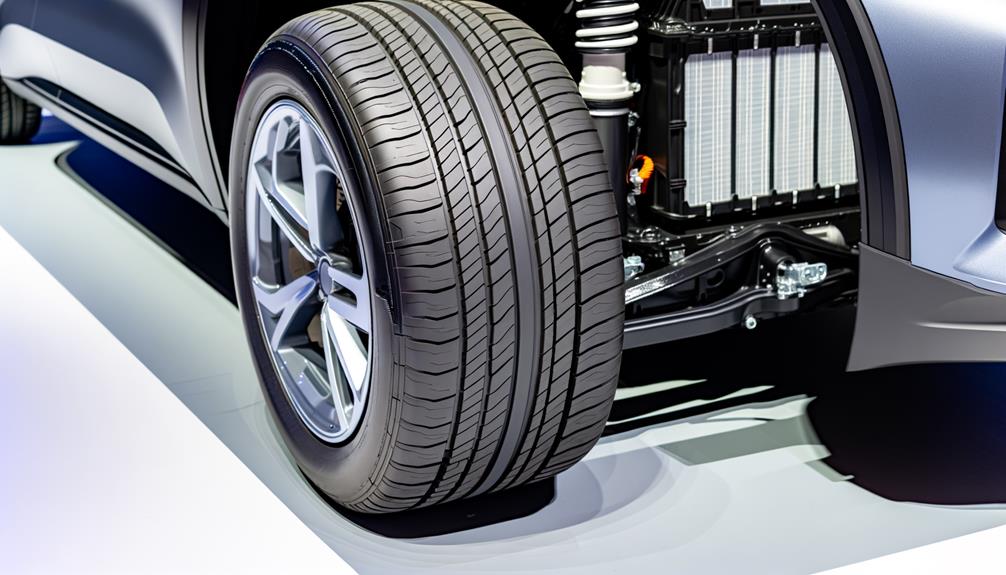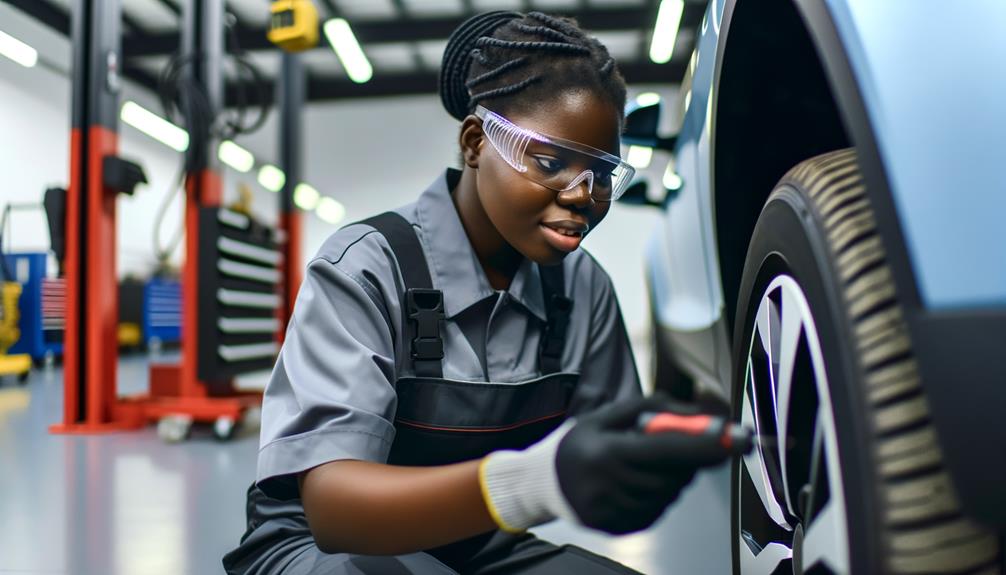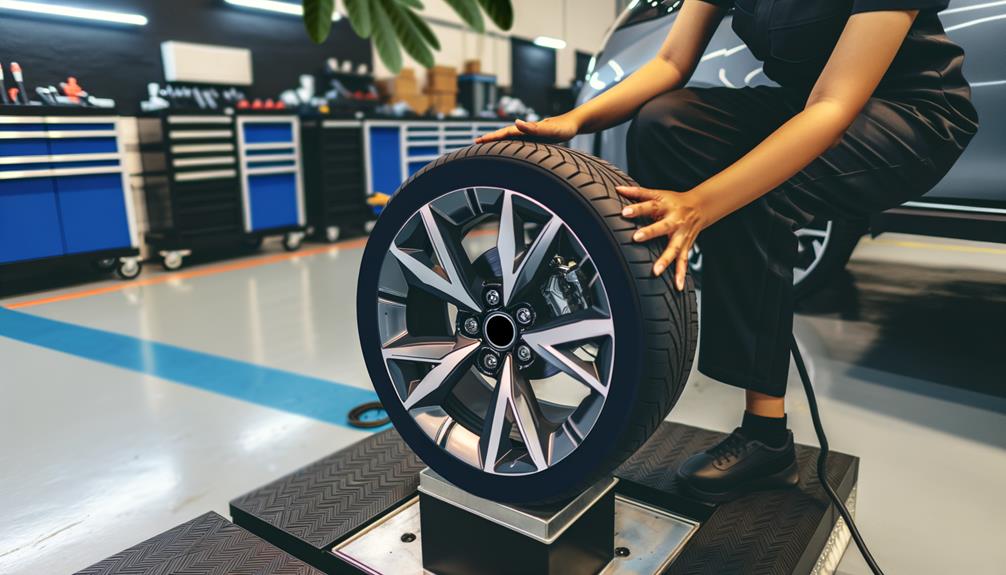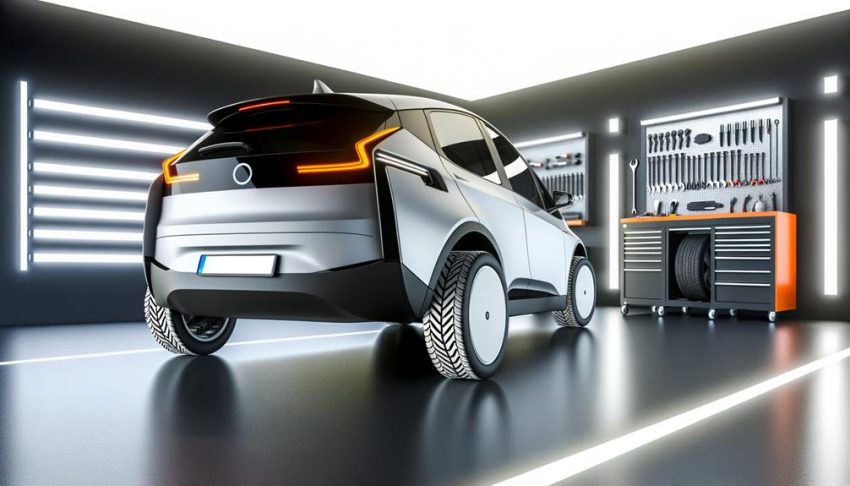When you're considering whether electric cars need special tires, it's important to understand the unique demands these vehicles place on their tires. Electric cars are heavier due to their battery systems, and they deliver instant torque, which can put extra strain on standard tires. Additionally, minimizing rolling resistance is vital for maximizing range, while reducing road noise can make for a quieter ride. So, do you really need to invest in EV-specific tires, or can you get by with conventional ones? Let's explore the key factors that might influence your decision and see why specialized tires could be essential for your electric vehicle.
Contents
Tire Requirements for EVs
When it comes to tire requirements for electric vehicles (EVs), it is essential to understand that these vehicles typically need specialized tires to handle their unique demands. Electric vehicles are at least 10% heavier than their internal combustion engine (ICE) counterparts due to their battery systems. This increased weight necessitates high-load capacity (HL) tires to guarantee optimal performance and safety. HL tires are specifically designed to support the heavier loads of EVs, preventing premature wear and maintaining vehicle stability.
In addition to load capacity, EV-specific tires must also manage the immediate torque delivery from electric motors. Unlike ICE vehicles, EVs can accelerate more quickly because of their instant torque, which can lead to faster tire wear if the tires aren't engineered to handle this stress. Consequently, these tires are constructed to offer enhanced traction and grip, which is crucial for maintaining control during rapid acceleration.
Another significant factor for EV tires is rolling resistance. While this will be discussed in more detail later, it is essential to recognize that low rolling resistance designs are fundamental to extending the driving range of EVs. Efficient tires can greatly impact the total energy consumption of the vehicle, making this an important consideration.
Rolling Resistance in EVs
When you consider the design of electric vehicle (EV) tires, rolling resistance plays a pivotal role in determining range and energy efficiency. Lower rolling resistance reduces friction, which translates to significant improvements in driving range—sometimes up to a 50-mile increase per 200 miles driven. A mere 20% rise in rolling resistance can cause a 5-8% range loss, making it essential to select tires engineered with proprietary materials and tread shapes that minimize energy loss while ensuring safety and performance.
Impact on Range
Understanding the impact of rolling resistance on an electric vehicle's range is vital for maximizing efficiency and performance. Rolling resistance, which accounts for roughly 16% of an EV's total energy consumption, plays an important role in determining how far you can travel on a single charge. Specialized EV tires are engineered to minimize rolling resistance while maintaining necessary grip, thus optimizing tire performance and extending the vehicle's range.
Lowering rolling resistance can greatly improve your EV's range. In fact, a 20% increase in rolling resistance can result in a 5-8% reduction in range. As a result, choosing the right tires is essential. With low rolling resistance tires, you could see up to a 50-mile increase in range over a 200-mile trip compared to standard tires, illustrating the significant impact tire choice has on an EV's efficiency.
Proprietary materials and optimized designs in EV tires are key to minimizing energy loss. These innovations directly contribute to enhanced driving range and overall vehicle performance. By focusing on rolling resistance, you can make informed decisions that greatly enhance your electric vehicle's efficiency and maximize the distance you can travel on a single charge.
Energy Efficiency Boost
Maximizing an electric vehicle's efficiency hinges on understanding the role of rolling resistance and its impact on energy consumption. Rolling resistance accounts for about 16% of an EV's total energy use, so minimizing it is vital. Electric vehicles need special tires because rolling resistance means energy loss. Reducing this resistance can greatly enhance your vehicle's range and efficiency.
Lower rolling resistance can considerably boost your EV's range. A 20% increase in rolling resistance might cause a 5-8% range reduction. Here's why:
- Enhanced Materials: Tire companies use proprietary materials to craft EV-specific tires. These materials reduce friction while maintaining the grip necessary for the high torque of electric motors.
- Optimized Design: Specialized tire designs balance minimal rolling resistance with essential safety features, ensuring an efficient yet secure ride.
- Performance Variance: Different tires, like those from Michelin, can vary up to 15% in rolling resistance, directly affecting energy efficiency and vehicle performance.
Efficient tire design not only cuts energy consumption but also boosts overall performance and longevity. Proper rolling resistance management means less wear and tear, contributing to your EV's durability and reliability.
Friction Reduction Benefits
Reducing friction through specialized tire design is essential for enhancing the efficiency and range of electric vehicles (EVs). Rolling resistance accounts for about 16% of the total energy consumed by EVs, making it an important factor to optimize. Electric vehicle tires are engineered with low rolling resistance to greatly enhance driving range by minimizing energy loss during movement.
When you choose tires with lower rolling resistance, you can expect a remarkable improvement in EVs efficiency. A mere 20% increase in rolling resistance can reduce your vehicle's range by 5-8%, so selecting the right tires is vital. Specialized materials and proprietary compounds, along with optimized tread patterns, are key to achieving low rolling resistance while retaining necessary grip for safety and performance.
The range impact is considerable; differences in rolling resistance between tire models can lead to a 50-mile range difference per 200 miles driven. Therefore, the correct tire choice directly influences your EV's overall efficiency and operational costs. By focusing on low rolling resistance without compromising grip, you can maximize your EV's performance and range, demonstrating the importance of specialized electric vehicle tires.
Weight Impact on Tires

When considering tires for electric vehicles, you must account for their increased load capacity due to the substantial weight of the batteries. This necessitates enhanced structural integrity to manage the dynamic stresses and guarantee durability. Specialized tire designs are essential to accommodate these requirements and prevent accelerated wear and potential safety issues.
Increased Load Capacity
Electric vehicles' (EVs) increased weight, primarily due to their sizable battery packs, necessitates tires with enhanced load capacity to guarantee safety and performance. This added weight, typically at least 10% more than internal combustion engine (ICE) vehicles, considerably impacts tire wear and braking distance. Consequently, high-load capacity tires are vital for EVs to secure ideal support and performance.
To manage the increased load capacity, high-load capacity tires are designed to:
- Distribute Weight Efficiently: These tires evenly distribute the extra weight across their structure, reducing stress points and minimizing tire wear.
- Enhance Braking Performance: The added weight of EVs can lead to longer braking distances. High-load capacity tires are engineered to provide better grip, guaranteeing shorter and safer braking distances.
- Durability: Constructed with robust materials, these tires withstand the additional torque and weight, reducing the frequency of replacements and assuring longevity.
Regular inspections and maintenance are imperative to monitor tire integrity. The unique weight distribution and higher torque of EVs can accelerate tire wear, making vigilant monitoring essential. By understanding and addressing these specific needs, you can guarantee your EV's tires provide the best safety and performance.
Enhanced Structural Integrity
Due to the substantial weight of electric vehicles—stemming from their hefty battery packs—there's a pressing need for tires with enhanced structural integrity. Electric cars are generally at least 10% heavier than their internal combustion engine (ICE) counterparts. This significant weight increase necessitates tire designs that can handle higher loads and dynamic driving conditions.
To address these demands, tire manufacturers have developed robust load-bearing carcass constructions specifically for EVs. These tires are engineered to withstand the increased weight loads and the unique stresses of electric vehicle operation. The heavier weight of EVs also contributes to longer braking distances and accelerated tire wear, demanding meticulous attention to tire design.
Proper tire design for EVs incorporates stronger materials and advanced construction techniques. This not only guarantees durability but also enhances performance and safety, even under the strain of high torque and rapid acceleration characteristic of electric cars. By focusing on these critical factors, tire manufacturers are effectively mitigating the risks associated with the excess weight of EVs, guaranteeing that the tires maintain their integrity and longevity. Enhanced structural integrity in tire design is essential for supporting the unique weight considerations of electric vehicles.
Road Noise Considerations
In the domain of electric vehicles (EVs), road noise considerations take on heightened importance due to the inherently quieter operation of these cars compared to their internal combustion engine (ICE) counterparts. Because EVs lack the noisy mechanical components of ICE vehicles, tire-generated road noise becomes much more noticeable. This makes noise reduction a vital factor in guaranteeing a pleasant driving experience.
To address this, EV-specific tires are engineered with advanced designs aimed at minimizing tire noise. For instance, technologies like Continental's ContiSilent™ can reduce interior noise levels by up to 9 dB(A). This is particularly beneficial in EVs, where the absence of engine noise amplifies any tire-generated sounds. Let's break down the factors that contribute to this need:
- Tire Design: EV-specific tires incorporate unique tread patterns and materials focused on reducing road noise. These designs help dampen the vibrations that cause tire noise, thereby enhancing the driving experience.
- Speed Sensitivity: At lower speeds, tire noise is more pronounced in electric vehicles. Specialized tire designs are essential for mitigating this, allowing for a quieter cabin environment.
- Surface Interactions: The effectiveness of noise reduction features can vary based on the road surface. EV tires are often optimized for different types of pavement to guarantee consistent noise reduction.
Given these considerations, it's clear that road noise reduction in EVs isn't merely a luxury—it's a necessity for maintaining driving comfort. By investing in EV-specific tires, you're not just improving noise levels; you're also enhancing the overall driving experience. Understanding the technical nuances of tire noise and its impact on road noise will enable you to make informed choices for your EV.
Maintenance of EV Tires

One significant aspect of maintaining your EV's performance and safety is diligent tire maintenance. EVs can experience accelerated wear, up to 20% faster than ICE vehicles, making regular tire inspections and maintenance essential. Key areas to focus on include tire pressure, rolling resistance, tread pattern, and overall maintenance practices.
Firstly, maintaining proper tire pressure is important. For optimal performance and range, EV tires often require higher inflation levels, sometimes reaching up to 45 PSI. Regularly checking and adjusting tire pressure guarantees your vehicle maintains its efficiency and reduces rolling resistance, which directly impacts energy consumption and tire life.
Tire rotation is another critical maintenance task. Due to the unique weight distribution and torque characteristics of EVs, uneven tire wear is common. Rotating your tires every 6,250 miles helps distribute wear more evenly, prolonging tire life and maintaining a consistent driving experience. Neglecting this can lead to premature tire replacement and compromised vehicle handling.
In addition to rotation, keeping an eye on tread pattern wear is essential. Accelerated wear can alter the tread pattern, affecting traction and safety. Regular inspections for cuts, punctures, and other damages are necessary to maintain tire integrity. Furthermore, proper alignment is indispensable; misalignment can cause uneven wear and reduce the lifespan of your tires.
Lastly, adhere to the NHTSA's recommendation of changing tires every six years. This guideline is especially pertinent for EVs given their propensity for accelerated wear. Through consistent and precise maintenance—monitoring tire pressure, guaranteeing proper alignment, and adhering to rotation schedules—you'll maximize the lifespan and performance of your EV's tires.
Innovations in Tire Technology
Revolutionizing the landscape of electric vehicle (EV) performance, tire manufacturers have introduced cutting-edge innovations tailored specifically to the unique demands of EVs. These innovations focus on balancing grip and low rolling resistance, which are critical for improving efficiency and extending range.
- Specialized Compounds:
- Manufacturers are developing advanced tire compounds, like the Green Chilli 2.0, which enhance braking performance while maintaining low rolling resistance. This is particularly important for EVs, given their high torque demands.
- Energy-Efficient Designs:
- Innovations such as the EcoContact™ 6 tire maximize the size and distribution of tire components. This design not only maximizes energy efficiency but also guarantees safety and performance aren't compromised. The unique tread profiles and structural stiffness are engineered to support the heavier weight and immediate torque delivery of electric motors.
- Noise Reduction Technologies:
- ContiSilent™ technology incorporates foam layers within the tire to greatly reduce in-cabin noise. Given the quieter operation of electric vehicles compared to combustion engines, reducing noise is essential for enhancing acoustic comfort.
These technological advancements are designed to address the unique dynamics of EVs. By focusing on elements like rolling resistance and grip, these tires deliver the efficiency and performance required for modern electric vehicles. As EVs continue to evolve, so too will the precision and sophistication of tire technology, guaranteeing that you benefit from peak performance, safety, and comfort on the road.
Selecting EV Tires

When it comes to selecting EV tires, prioritizing those designed specifically for electric vehicles can greatly impact performance and efficiency. These tires aren't just about fitting your wheels—they're engineered to meet the unique demands of electric vehicles, which are typically at least 10% heavier than their internal combustion engine counterparts.
One significant factor to take into account is the load index. Given the additional weight of electric vehicles, you need tires with a higher load index to guarantee safety and longevity. EV-specific tires often feature low rolling resistance, which can greatly enhance your vehicle's range. Studies show that tires with low rolling resistance can improve energy consumption by approximately 16%, an important consideration for maximizing your EV's efficiency.
Traction is another key element. EV tires are constructed from specialized materials and compounds designed to provide superior grip. This is essential for handling the immediate torque delivery of electric motors, which not only reduces wear but also enhances safety. Brands like Goodyear, Michelin, and Pirelli specifically produce EV tires that balance traction, durability, and noise reduction, catering to the unique driving dynamics of electric vehicles.
Regular maintenance is crucial for getting the most out of your EV tires. Verify you check tire pressure regularly, up to 45 PSI, and rotate your tires every 6,250 miles. This will help in maintaining ideal performance and extending the tire's lifespan.
Frequently Asked Questions
Can You Use Regular Tires on an Electric Car?
You can use regular tires on an electric car, but tire compatibility issues may arise. Performance factors, wear patterns, and handling characteristics could suffer. Additionally, noise levels might increase, affecting the driving experience. Consider EV-specific tires for best results.
Do EV Tires Cost More Than Regular Tires?
Yes, EV tires cost more due to factors like tire longevity, performance factors, environmental impact, advanced tread design, and noise reduction. These elements enhance durability, efficiency, and comfort, justifying the higher price for specialized EV tires.
Do You Need Special Tyres for Electric Cars?
You do need special tires for electric cars. These tires are optimized for tire performance, energy efficiency, noise reduction, and tread design to handle the unique weight distribution and high torque of EVs, ensuring ideal driving conditions.
What Is the Difference Between EV Tires and Normal Tires?
EV tires differ from normal tires by incorporating advanced tire technology for ideal weight distribution, minimizing rolling resistance, and enhancing noise reduction. They feature specialized tread patterns to handle higher torque and unique wear characteristics.
Conclusion
In summary, opting for EV-specific tires is essential for maximizing your electric vehicle's performance. These tires are meticulously engineered to manage the increased weight, deliver ideal grip during high torque acceleration, and minimize rolling resistance, thereby enhancing driving range and energy efficiency. Additionally, their noise-reduction technologies guarantee a quieter ride. Prioritizing these specialized tires will make certain your EV operates at its peak, offering a balanced combination of safety, efficiency, and comfort.
